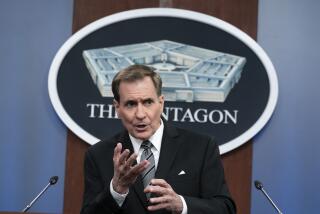Powell Says Politics Were Not Behind Flawed Terror Report
WASHINGTON — Secretary of State Colin L. Powell on Sunday blamed mistakes in data collection, not political considerations, for a “very embarrassing” State Department report that said terrorist attacks worldwide had decreased in 2003 when, in fact, they had risen significantly.
On Sunday TV talk shows, Powell acknowledged that the State Department’s annual “Patterns of Global Terrorism” report, issued with great fanfare April 29, was badly flawed.
He said he was convening an interagency meeting today to determine why the 199-page report contained so many mistakes and omissions, including several terrorist attacks on Nov. 11 that killed 62 people in Turkey.
“Very embarrassing. I’m not a happy camper on this,” Powell said on NBC’s “Meet the Press.” “We were wrong.... We’re going to get to the bottom of it tomorrow” and reissue the report as soon as possible.
“It’s not a political judgment that said, ‘Let’s see if we can cook the books.’ We can’t get away with that now,” Powell said on ABC’s “This Week” with George Stephanopoulos. “Nobody was out to cook the books. Errors crept in.”
The Times reported Wednesday that State Department officials were scrambling to revise and reissue the report after questions were raised about errors that were apparent from the department’s own data.
The turnabout represented the first time the State Department has had to significantly rewrite the report since it was first ordered up by Congress two decades ago as the government’s authoritative reference tool on worldwide terrorist activity, trends and groups.
As issued, the report said the number of terrorist attacks had declined by 45% since 2001, dropping to its lowest level in 34 years. At the time, Deputy Secretary of State Richard L. Armitage said the report offered “clear evidence” that the Bush administration was prevailing in the fight against global terrorism.
Rep. Henry A. Waxman (D-Los Angeles) said in a May 17 letter to Powell that the report had excluded several major attacks and other readily available information that, when added, showed terrorist attacks were at their highest levels in decades, not their lowest.
“This manipulation may serve the administration’s political interests,” Waxman wrote, “but it calls into serious doubt the integrity of the report.”
Powell said the revised report would reflect a sharp increase in terrorist acts in 2003. And he said he had called Waxman personally to assure him that the Bush administration’s efforts to publicize successes in its counter-terrorism policies had no influence on the report’s contents.
Powell said State Department and CIA staffers worked through the weekend to determine what went wrong in the data collection process. He said he would meet with his staff and representatives of the CIA and other counter-terrorism agencies today “to find out how these numbers got into the report.”
Powell said the State Department had received its terrorism statistics for 2003 from the new Terrorist Threat Integration Center, which brings together analysts from the CIA, FBI and other agencies. In prior years, the CIA provided the data.
“When you look at it in hindsight now ... all sorts of alarm bells should have gone off. All sorts of, as I say to my staff, circuit breakers should have dropped when we saw this data, and they didn’t,” Powell said on “Meet the Press.” “But I don’t think there was anything political or policy driven about it.”
Powell stopped short of blaming the CIA. “I’m not saying it is responsible until I sit down with all of the individuals who had something to do with this report,” he said.
A State Department official said Powell was unhappy with the CIA and the threat center for providing faulty information -- and even angrier at his senior aides for the report’s omissions.
“There’s a lot of blame to go around,” the official said. “The question he’s asking is, ‘Why didn’t you guys question this?’ ”
Powell also declined to comment on whether his department’s release of the flawed report undermined his own credibility, particularly in conjunction with his embrace of the CIA’s prewar intelligence on Iraq, which he now concedes was also flawed and inaccurate.
Tim Russert, the host of “Meet the Press,” asked Powell: “Why shouldn’t the American people lose all confidence in the information their government is giving them from the CIA about weapons of mass destruction, about terrorism, and who knows what else?”
Referring to the prewar intelligence on Iraq, Powell said, “Well, we’ve got to get to the bottom of that.”










